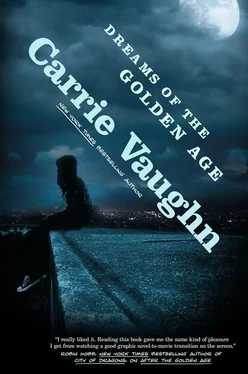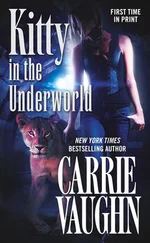Then again, she had that youthful association with the Destructor. Most commentators dismissed that as old news.
It was all very vague. Anna could try to track down some kind of evidence of who the Executive was and what he was really doing. But there wasn’t even enough information to start an investigation. She’d just have to do what Eliot suggested: keep her eyes open for any evidence that might present itself.
* * *
That same night, the Trinity stopped an actual, honest-to-God bank robbery. The MO was standard by now: The police arrived to find the robbers immobilized and unconscious, chilled by ice or knocked out by blasts, and the supers lingered just long enough to make sure that blurry photos were acquired. Anna was sure Teia was calling the Eye to tell them where to be. Teia was also probably keeping a scrapbook and practicing lines to use on Anna to rub her face in it.
Even if she and Teddy had stumbled across a bank robbery during their patrol, what could they have done about it? Nothing. That day at school, she avoided everybody, Teia, Lew, Sam, even Teddy. She didn’t want to talk about it, so she hid out until the bell rang and everyone else had gone to class. Being five minutes late was a small price to pay.
Maybe Eliot would e-mail her. Maybe.
* * *
The second time they went out on patrol—Teddy insisted on giving the patrol another try because he said it made him feel like a real superhero even if they didn’t actually accomplish anything—he brought his paintball gun, fully loaded.
She’d been furious. “What, we can’t actually stop bad guys so you want to just piss them off?”
“I just want to try something,” he’d insisted. At this rate, they were going to end up in jail for being public nuisances. She couldn’t talk him out of it, so there they were, in the run-down tenement neighborhoods south of downtown, Anna skulking and Teddy striding confidently, holding the paintball gun across his chest like he was in some war movie. The guy really wanted to be an action hero, and it seemed tragic that his powers were so unassuming.
He was still more powerful than she was. She wondered if she could expand her awareness to, maybe, concepts. Like she could think about “crime” or “mugging” and be able to locate something like that happening nearby. She gave herself a headache trying, but she could only ever find people, and only ones she’d already spent a lot of time thinking about. Like Eliot.
She needed to stop thinking about Eliot.
The city at night was becoming increasingly familiar, and even comfortable. The regularly spaced yellow halos of streetlamps illuminating near-empty streets, walls of shadowed buildings blocking out the sky made the whole place seem like a kind of oversized playground. As long as you knew where you were, knew where you were going, and paid attention to what was going on in between, the city at night couldn’t hurt you.
She was pretty sure they weren’t going to find anything just by walking around. The Trinity had all the luck on that score. So she was surprised when they heard an incongruous wrenching, metal on metal, and an associated string of cursing.
They slowed at the end of the block and peered around the building’s corner. Up ahead, two guys with a crowbar and bolt cutters were breaking into the steel overhead door at a loading dock. Anna didn’t know what was in the building; in this part of town, it was just as likely to be abandoned. Still, the guys were breaking and entering. This was exactly the kind of situation the Trinity would eat up. She sighed. Teia and the others were out and about, but not here.
“Here,” Teddy said, handing her a cell phone. She didn’t recognize it—it wasn’t his usual phone but a cheap pay-as-you-go model, the kind you could get at convenience stores.
“What’s this?” she whispered.
“Call nine-one-one.”
That plan was better than nothing. They might be little more than a neighborhood watch at this point, but at least it was something.
“And stay out of sight,” he said, before vanishing.
She stopped herself from calling out to him, gritted her teeth, and called the cops.
“Nine-one-one dispatch, what is your emergency?”
“Um, yeah, I’m at the corner of Vineland and Fifty-third, and there’s a couple of guys breaking into a building here. They’ve got crowbars and stuff and they’re wrenching the door open.”
The thunk of the paintgun firing sounded up ahead, right in front of the loading dock door. No sign of Teddy. Point-blank range, and they didn’t see him. He fired four or five shots, and all of them hit. The guys writhed and shouted, but when they turned to look for their assailant, they saw nothing. Anna saw nothing. Teddy fired another two shots, which hit, and the guys doubled over at the impact, straight in their guts. Had to hurt.
“Ma’am? Are you still there?” the dispatcher asked.
“Um, yeah. These guys? One’s white, one’s black. They’re dressed in black coats and stocking caps. And, um … they’re splattered with yellow paint. Really bright yellow paint.”
“Did you say paint?”
“Yeah. Like from a paintball gun.”
“I’m sending a patrol car to that location now. Are you in any danger?”
“No, I’m fine. I … I have to get going, bye.” She switched off the phone.
Unable to figure out who was attacking them with paintballs, the hoodlums ran. The problem was, they ran right toward her and would be on her in seconds. She turned and charged for the nearest likely hiding place—the stairwell down to a garden-level doorway. They probably wouldn’t take well to having a witness and were still hefting the crowbar and bolt cutters.
Hunched down on the concrete steps, she listened to their footsteps pound away. Much closer than she expected, a police siren howled. A patrol car, right in the neighborhood. One of the crooks cursed, and this was all going to get very exciting in a couple of minutes.
The actual pursuit and arrest happened a couple of blocks away, so Anna didn’t get to see it. If the guys were still holding their array of tools, they were sure to be taken in and charged. She imagined the stray yellow paint spatters would tell the cops exactly what door they’d been attacking.
She wanted to get out of the area entirely, but she didn’t feel like leaving her hiding space until she was absolutely sure she wouldn’t be spotted. Teddy had it easy.
Finally, a voice hissed above her. “Hey, you can come out now.”
As she tromped up the stairs, Teddy flashed into visibility. It was like switching on a TV.
He was grinning. “Wasn’t that cool?”
She handed the phone back to him. “You could have told me you had a plan.”
“I wanted it to be a surprise.”
She rolled her eyes.
“So now we have a system,” he insisted.
“That isn’t a system, it’s—” She threw up her hands and glared, because she couldn’t think of what that was. “We still need the cops to do all the work, you know?”
“You’re no fun.”
“I’m sorry I’m no fun.” She walked off. She was tired, frustrated, and she wanted to go home.
“Anna—I mean, Rose! Wait up!”
“I’ll talk to you later,” she said and caught her own bus home.
CELIA’Sschedule was full. She liked it that way, now more than ever.
Second and third opinions on the leukemia diagnosis were acquired, confirming the first diagnosis. She and Arthur spent an afternoon poring over treatment options and survival statistics. The prognosis was generally good. If the chemotherapy worked, she’d probably be fine. If it didn’t, treatment options remained, but her odds decreased. It felt like rolling dice. Nothing to do then but roll and get it over with. Arthur made discreet phone calls and they arranged for her to receive treatments in one of the penthouse’s unused guest rooms. She hired a nurse and paid very well for her secrecy. Celia would receive her first round of chemotherapy by infusion on Friday afternoon, have the weekend to deal with side effects, and do everything she could to be back on her feet by Monday. No one would ever know, not until she was good and ready to let them know.
Читать дальше












